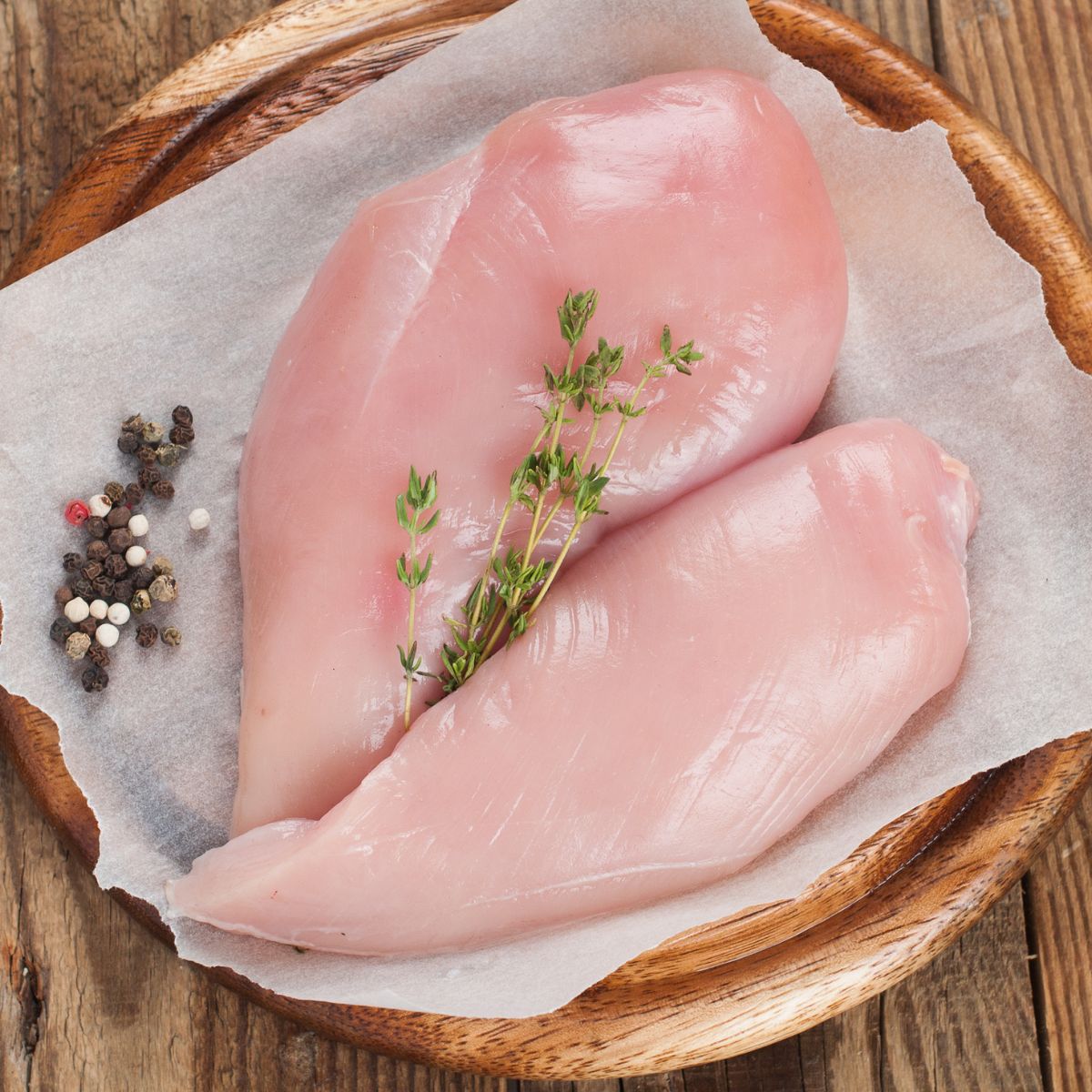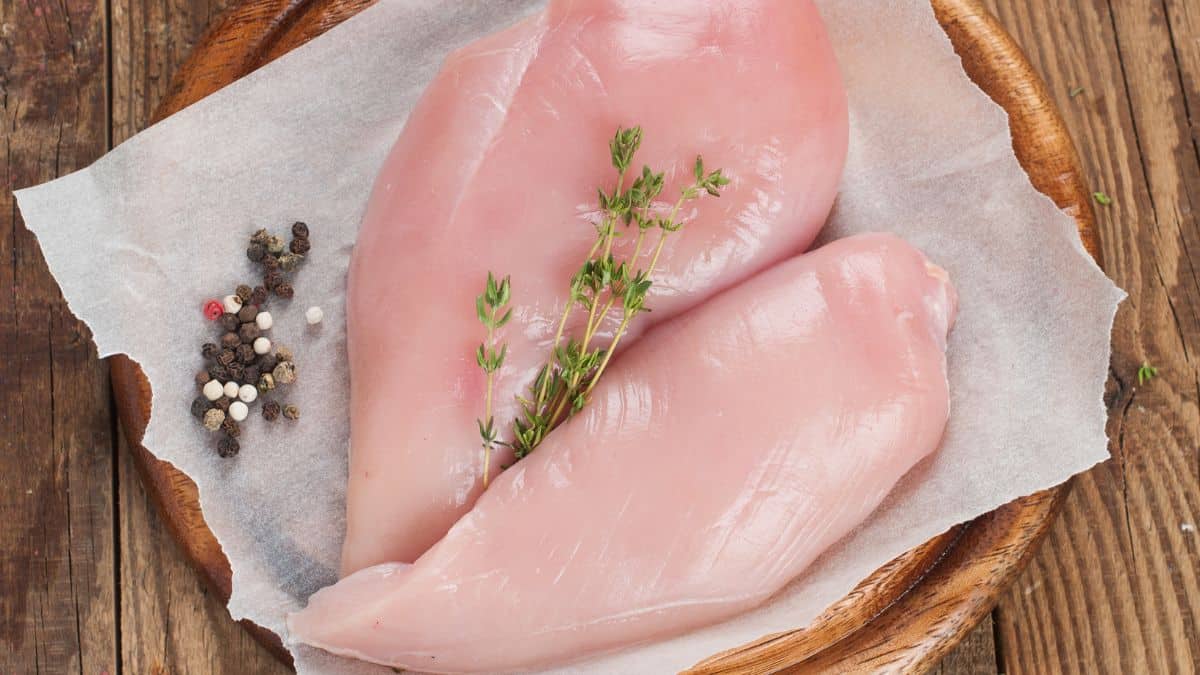How much does a chicken breast weigh: This ultimate guide is full of tips and tricks on how to correctly measure a chicken breast’s weight! I cover everything from the variables that affect their weight to the different types of weight so you can quickly figure out how much chicken you need! Plus, I even share some delicious recipes for you to try!
Measuring A Chicken Breast’s Weight
If you are curious to know how much a chicken breast weighs, then you’ve come to the right place! It’s important to learn how to properly measure chicken so that you are able to calculate the nutritional values and determine how much you need to buy!
With a few tips, tricks, and my easy reference chart, you’ll know exactly how to determine the weight of a chicken breast! Whether you are cooking bone-in and skin-on chicken breasts or boneless skinless chicken breasts, all the information you need can be found below!

Jump to:
- Measuring A Chicken Breast’s Weight
- How Much Does A Chicken Breast Weigh
- Raw vs Cooked
- Boneless vs Bone-In
- Skinless vs Skin-On
- Frozen vs Thawed
- Average Weight Of A Chicken Breast
- Equivalent Measurements
- Easy Ways To Measure A Chicken Breast
- 🐔 Best Chicken Breast Recipes
- 💬 Reviews
If you are looking for some easy and tasty chicken dinner ideas, I’ve gathered a list of my favorite chicken breast recipes! Also, I have a full list of what to serve with chicken that includes the most delicious sides to make your chicken breasts a well-round dinner!
How Much Does A Chicken Breast Weigh
On average, a chicken breast can weigh anywhere between 4-12 ounces depending on the size. However, there are a few factors that will alter the weight of a chicken breast such as – if it’s raw or cooked, boneless or bone-in, skinless or not, frozen or thawed.
Raw vs Cooked
When you cook a chicken breast, its weight will decrease by around 20-25%. This is because some of the water and fat content of a chicken breast is cooked out, meaning it decreases in weight and shrinks in size. The amount of shrinkage will depend on the method that you choose to cook your chicken breast.
Oven roasting and grilling cause the most water loss while broiling and braising chicken breasts will cause less. The larger the chicken breast is, the more it will shrink. Therefore, a raw chicken breast will always weigh more than a cooked one.
See more : How to Measure Chicken: Pounds, Grams, and Cups
An average raw chicken breast will weigh between 4-8 ounces and a cooked chicken breast will weigh between 2-6 ounces.
Boneless vs Bone-In
A huge factor in a chicken breast’s weight is whether it comes with the bone in or out. The bone in a chicken breast accounts for about 20% of its weight, so it will weigh a lot more than a boneless breast. Bone-in chicken breasts (without skin) will typically weigh between 10-15 ounces.
Bone-in or ‘split chicken breasts‘, are typically cheaper in price but you might get a slightly lower amount of consumable meat than boneless. However, keeping the bone in will help lock in more moisture and pack extra flavor into the meat.
Boneless chicken breasts are more commonly purchased and a lot easier to prepare. There’s no wrong choice when choosing between the two, it all comes down to personal preference.
Skinless vs Skin-On
The skin on an average chicken breast weighs around 1 ounce or 28 grams. If you prefer to have a crispy crust on your chicken breast, it really won’t make a huge difference in weight compared to the bone. Again, it’s more of a personal preference and something to keep in mind!
Frozen vs Thawed
Frozen chicken can weigh more than thawed chicken if there is an ice layer present. As long as the extra water is cooked out, then it will weigh very close to the same amount as a thawed chicken breast or a fresh one.
If you purchase pre-frozen chicken from the grocery store, it often will have a special coating so that each breast will not stick together. This coating will cause the chicken breasts to weigh more.
It’s essential to make sure that the extra moisture evaporates or you can end up with more water in your food than you’d like. Leave your chicken breast out at room temperature for a few minutes before cooking it to help draw out moisture.
Average Weight Of A Chicken Breast
The average boneless and skinless chicken breast weighs approximately 174 g (6 ounces). Smaller chicken breasts can weigh between 140-150 g (4-5 ounces) and larger chicken breasts can weigh over 250 g (8 to 10 ounces).
See more : Understanding the Sell By Date on Chicken: What To Know
Here is how to convert grams, ounces, and pounds:
- 1 ounce is equal to 28.25 grams – multiply the # of ounces of your chicken breast by 28.25 to get the weight in grams.
- 1 gram is equal to 0.035274 ounces – multiply the # of grams of your chicken breast by 0.035274 to get the weight in ounces.
- 1 ounce is equal to 0.0625 pounds – multiply the # of ounces of your chicken breast by 0.0625to get the weight in pounds.
Equivalent Measurements
Follow this helpful chart that breaks down the average weight of chicken breasts in grams, ounces, and pounds:

Easy Ways To Measure A Chicken Breast
There are a few easy methods to use when measuring the weight of your chicken breasts.
The most accurate way is by using a food scale (or kitchen scale). Most scales have the option to set your weight in grams or ounces, then you can convert it to pounds with some simple math.
When you’re at the grocery store, you can determine the approximate weight of each chicken breast from the overall weight of the package. Divide the total weight of the package by the number of chicken breasts in it. Note that packaged chicken is usually weighed in pounds.
For example, let’s say that your package of chicken weighs 1.6 pounds and there are 4 individual chicken breasts inside. Divide 1.6 by 4 which equals 0.4 lbs. There are 16 ounces in 1 pound, so multiply 0.4 x 16 and you get 6.4 ounces per individual chicken breast.
Lastly, you can use your hand as a visual guide to quickly measure chicken. An average chicken breast will be close to the size of your hand.
Now you know everything about how much a chicken breast weighs and how you can measure them for your chicken recipes! Do you have a favorite chicken breast recipe that you have tried? Leave a comment down below to let me know!
>>>>See all of my recipes HERE<<<<
🐔 Best Chicken Breast Recipes
- Baked Boneless Chicken Breasts – These perfectly cooked chicken breasts with meat that is so tender and juicy!
- Sous Vide Chicken Breast – This recipe covers all of the tips and tricks to make a delectable chicken breast sous vide!
- Air Fryer Chicken Breast – Boneless and skinless chicken breasts are seasoned with a dry brine and cooked quickly in the air fryer!
- Million Dollar Baked Chicken Breast – This delicious chicken dinner features chicken breasts covered in 3 different kinds of cheese and crispy bacon!
- Stuffing Stuffed Chicken Breast – Savory stovetop stuffing and cranberries are stuffed into butter-fly cut chicken breasts!
- Maple Bacon Dijon Chicken Breasts – This chicken breast recipe is perfect for serving with noodles, rice, or potatoes!
Nigel Gildon editor:Nigel Gildon is the editor of Chef Wayne’s Big Mamou: Chef Wayne’s Big Mamou. He has worked in the publishing industry for many years and has a passion for helping new authors get their work into the hands of readers. 63 Liberty Street * Springfield, MA 01003









